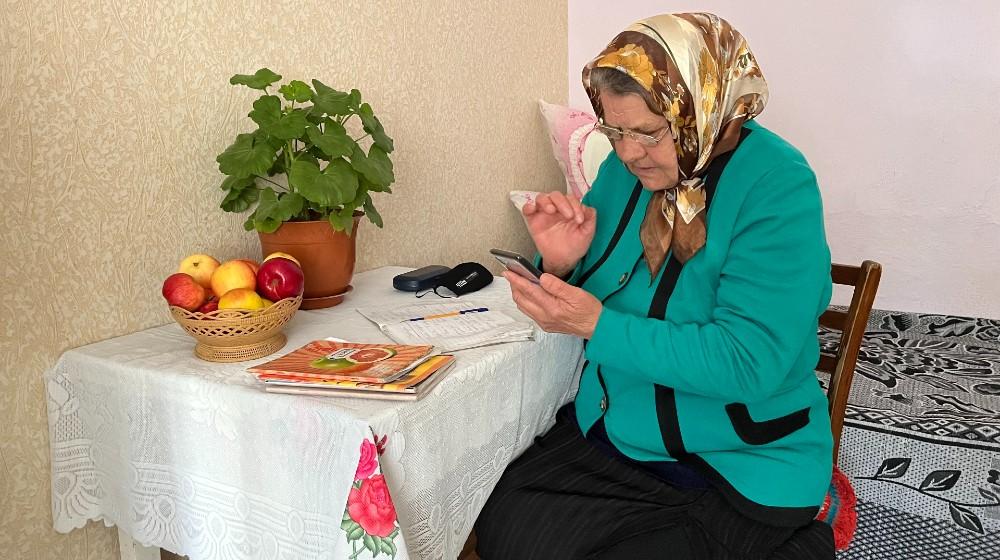‘During the pandemic I ended up alone, with no connection to my children"
We met Olga Carabet at a group meeting with the psychologist in Cazangic village, Leova district, organised by the UN Population Fund (UNFPA Moldova) for the older people participating in the Digital Skills Connect Generations program, implemented in partnership with the Ministry of Labour and Social Protection, Swiss Agency for Development and Cooperation, Moldcell Foundation and HelpAge. Aged 72, she has been living alone for the past 12 years, after her husband died and her children left for the big world. Coming from a large family, she did not have the opportunity to study, although she dreamed of becoming a cook.
Her three children have left for abroad, either to study or live. She has occasionally communicated with her elder children via landline telephone, but she hadn’t been in contact with her younger son for many years. At the group meeting with the psychologist, she talked about this with tears in her eyes. ‘I hadn't heard from my youngest son for 5 years. At that time I didn't have a mobile phone and Internet; if I had, maybe it would have been easier to find each other’, she wipes away her tears, saying that they have finally reunited.
To overcome social isolation during the pandemic, UNFPA Moldova, Swiss Agency for Development and Cooperation, and Moldcell Foundation donated mobile phones for 300 elderly people
Thousands of other older people from the Republic of Moldova ended up in a similar situation as Mrs Olga. In the fall of 2022, just a few months after the onset of the COVID-19 pandemic, UNFPA Moldova launched the Digital Skills Connect Generations project to help older people overcome social isolation and create intergenerational dialogue. As part of the project, 300 older people received a phone connected to the Internet and were trained by young volunteers how to use it to keep in touch with their loved ones, overcoming the isolation in which they found themselves. Mrs Olga was one of them: ‘I have been living alone for many years, all my children have settled abroad. When the coronavirus pandemic started, I didn't have anyone close. Thanks to this phone, I never felt alone.’
Meetings with a psychologist to cope with the stress during the pandemic
In addition to training on how to use the phone, the 300 older people participated in meetings on the use of public services, such as the reallocation of the pension on www.gov.cnas.md or the services offered by the e-Governance Agency. Moreover, they attended meetings with psychologists, where they learned about the importance of mental health, how to deal with stress and negative emotions, how to be productive, as well as received advice on how to cope with stress, especially amidst the pandemic: ‘Believe me, until now I thought that only those who have problems with their heads go to the psychologist, but after this meeting I understood that it is actually about each of us, about our problems’, confesses our heroine.
At the meeting, the psychologist advised the older people to engage in activities that bring them satisfaction and joy, and when I asked Mrs Olga how she spends her time, she hurried to answer: cooking. A passion that was reborn once Mrs Olga took the phone in her hands: ‘I'm looking for recipes on the Internet, on Yotube or on Facebook, and I write them down in a special notebook. Look, it's almost full already. Cooking has always been my favourite occupation, and even if my loved ones are not around to taste, I serve my neighbours or the volunteer, who is ready to guide me at any time.’
Generations get closer: the volunteers are a call away from the older people
The 75 volunteers taught the older people how use their mobile phones and social networks, offering them support outside of training, always being at a call away. Maria, for example, is always ready to guide Mrs Olga, and advise her how to use the phone and even how to do certain household chores.
After the meeting with the psychologist, Mrs Olga invited us to taste the pumpkin pies she cooked according to a new recipe, found on Yotube. The volunteer helps her in the kitchen: ‘Maria has become like a daughter to me. She always answers my questions about the phone, and while she is helping me - I serve her with goodies. This way I also feel younger’, says Mrs Olga excitedly.
‘I have seen my great-grandson for the first time thanks to the smartphone.’
A year ago, Mrs Olga became great-grandmother. She has never met her great-grandson, as he was born and lives in Romania. The phone helped her to see him for the first time and observing him growing up. She feels as if she were next to him: ‘The phone helps me feel close to my children, grandchildren and great-grandchildren. I can contact them whenever I want, including my great-grandson.’
In the Republic of Moldova, almost 5 out of 10 people aged 55-74 use the Internet at least once a week, according to the Active Aging Index. According to demographic forecasts, given the current population decline, especially the decrease in young people due to external migration and negative natural growth, by 2030 the share of the population aged 60+ will be about 28%.
The Digital Skills Connect Generations project aims to support the social and digital inclusion of older people with the help of young people. The project is funded by UNFPA Moldova, Moldcell Foundation and Swiss Cooperation in Moldova and conducted by HelpAge International Moldova in partnership with the Ministry of Labour and Social Protection of the Republic of Moldova in 25 rural localities.


